英语写作手册unit
- 格式:ppt
- 大小:827.00 KB
- 文档页数:27
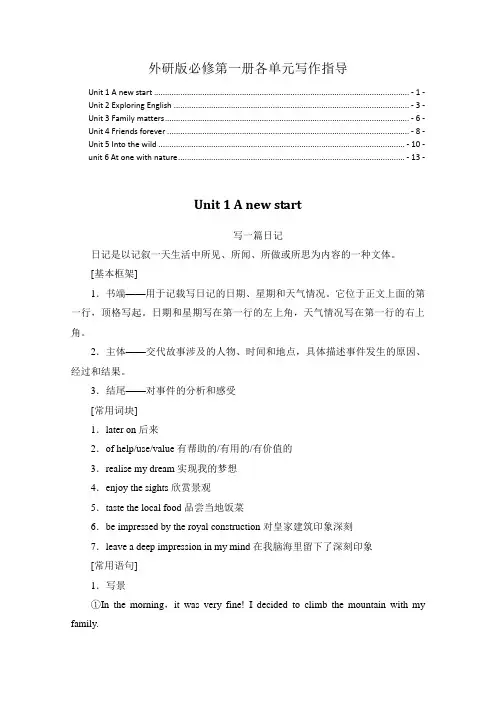
外研版必修第一册各单元写作指导Unit 1 A new start .................................................................................................................... - 1 - Unit 2 Exploring English ........................................................................................................... - 3 - Unit 3 Family matters ............................................................................................................... - 6 - Unit 4 Friends forever .............................................................................................................. - 8 - Unit 5 Into the wild ................................................................................................................ - 10 - unit 6 At one with nature ....................................................................................................... - 13 -Unit 1 A new start写一篇日记日记是以记叙一天生活中所见、所闻、所做或所思为内容的一种文体。
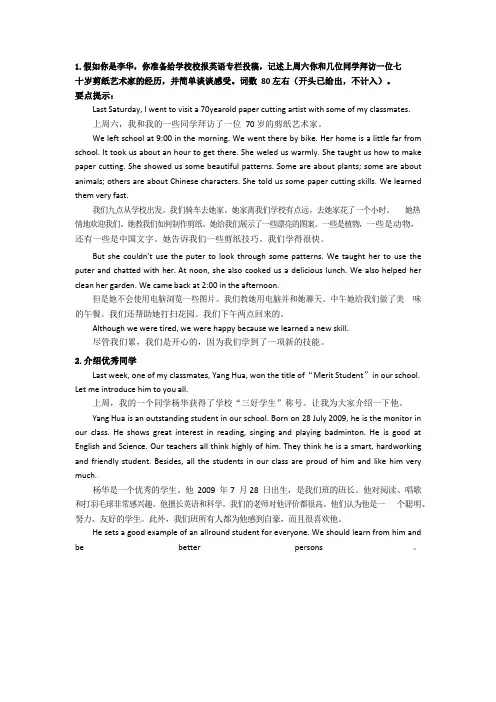
1.假如你是李华,你准备给学校校报英语专栏投稿,记述上周六你和几位同学拜访一位七十岁剪纸艺术家的经历,并简单谈谈感受。
词数80 左右(开头已给出,不计入)。
要点提示:Last Saturday, I went to visit a 70yearold paper cutting artist with some of my classmates.上周六,我和我的一些同学拜访了一位70 岁的剪纸艺术家。
We left school at 9:00 in the morning. We went there by bike. Her home is a little far from school. It took us about an hour to get there. She weled us warmly. She taught us how to make paper cutting. She showed us some beautiful patterns. Some are about plants; some are about animals; others are about Chinese characters. She told us some paper cutting skills. We learned them very fast.我们九点从学校出发。
我们骑车去她家。
她家离我们学校有点远。
去她家花了一个小时。
她热情地欢迎我们。
她教我们如何制作剪纸。
她给我们展示了一些漂亮的图案。
一些是植物,一些是动物,还有一些是中国文字。
她告诉我们一些剪纸技巧。
我们学得很快。
But she couldn’t use the puter to look throug h some patterns. We taught her to use the puter and chatted with her. At noon, she also cooked us a delicious lunch. We also helped her clean her garden. We came back at 2:00 in the afternoon.但是她不会使用电脑浏览一些图片。
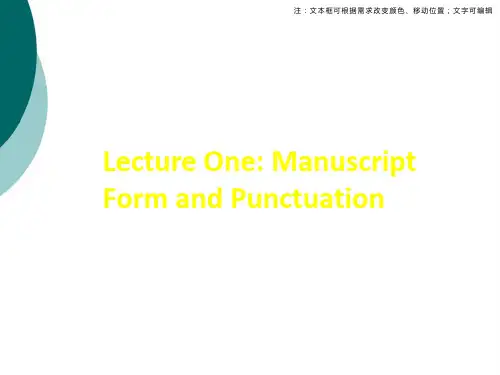
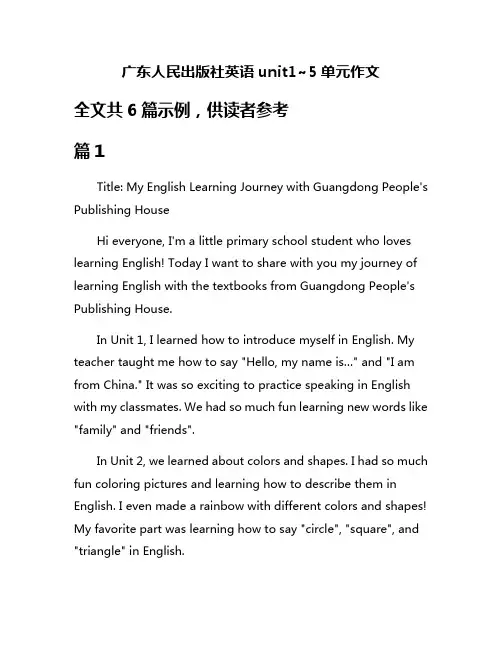
广东人民出版社英语unit1~5单元作文全文共6篇示例,供读者参考篇1Title: My English Learning Journey with Guangdong People's Publishing HouseHi everyone, I'm a little primary school student who loves learning English! Today I want to share with you my journey of learning English with the textbooks from Guangdong People's Publishing House.In Unit 1, I learned how to introduce myself in English. My teacher taught me how to say "Hello, my name is…" and "I am from China." It was so exciting to practice speaking in English with my classmates. We had so much fun learning new words like "family" and "friends".In Unit 2, we learned about colors and shapes. I had so much fun coloring pictures and learning how to describe them in English. I even made a rainbow with different colors and shapes! My favorite part was learning how to say "circle", "square", and "triangle" in English.Unit 3 was all about animals. I learned the names of different animals like "elephant", "monkey", and "panda". We sang songs about animals and played games to practice our new vocabulary.I can't wait to visit the zoo and see all the animals in real life!In Unit 4, we learned how to talk about the weather. I learned how to say "It's sunny", "It's rainy", and "It's windy". I enjoyed drawing pictures of different weather conditions and practicing my conversations with my friends.Finally, in Unit 5, we learned about daily routines. I learned how to say "I wake up", "I brush my teeth", and "I go to school" in English. It was so much fun acting out our daily routines in class and practicing our speaking skills.Overall, learning English with Guangdong People's Publishing House has been an exciting journey for me. I have learned so much and can't wait to continue improving my English skills. Thank you Guangdong People's Publishing House for helping me become a better English speaker!篇2Unit 1: GreetingsHey everyone! Today I want to share with you some cool stuff I learned from Unit 1 of our English book. This unit is all about greetings and how to say hello to people. It's super fun!In the unit, we learned different ways to greet people like saying "hello", "hi" and "hey". We also learned how to ask someone how they are doing, like saying "How are you?" or "What's up?" It's important to be polite and friendly when we talk to others.Unit 2: FamilyIn Unit 2, we talked about family. It was so interesting to learn the names of different family members like mom, dad, brother, sister, grandma and grandpa. We also learned how to talk about our own families and describe them. My family is pretty big with lots of cousins and aunts and uncles!Unit 3: NumbersUnit 3 was all about numbers. We learned how to count from 1 to 100 and even higher! It was so fun practicing our counting and doing math problems with numbers. I think I'm getting pretty good at this!Unit 4: ColorsColors, colors, colors! Unit 4 was all about colors. We learned the names of different colors like red, blue, yellow, green, orange, purple and pink. It was fun to learn how to describe things using colors. My favorite color is blue. What's yours?Unit 5: AnimalsThe last unit we studied was all about animals. We learned the names of different animals like dog, cat, bird, rabbit, fish, and elephant. I love animals, so this was my favorite unit. I think I want to be a veterinarian when I grow up so I can help take care of animals.I had so much fun learning all of this cool stuff in our English book. I can't wait to learn more in the next units! English is so fun and I love practicing my new skills with my friends. Bye for now!篇3Title: My English Learning Journey with Guangdong People's Publishing HouseHi everyone, I am a primary school student and I want to share with you my exciting English learning journey with Guangdong People's Publishing House. In this article, I will talkabout the fun and interesting things I have learned from Unit 1 to Unit 5.In Unit 1, I learned basic greetings like "Hello" and "Goodbye". It was so much fun practicing with my friends and teachers. Unit 2 taught me how to introduce myself and talk about my family. I even made a family tree project to show my classmates.Moving on to Unit 3, I learned about different animals and their names in English. I enjoyed drawing pictures of animals and learning new words like "lion", "elephant", and "giraffe". Unit 4 was all about food and drinks. I got to try some new snacks and drinks while learning how to say them in English.In Unit 5, I learned about places in the city like the park, school, and hospital. It was exciting to pretend to be a tourist and ask for directions in English. I also learned how to describe the weather and seasons in English.Overall, my English learning journey with Guangdong People's Publishing House has been amazing. I can't wait to learn more and improve my English skills. Thank you for reading about my journey! Bye bye!篇4Hello everyone! Today I'm going to write a super-duper long essay about the English units 1-5 from the Guangdong People's Publishing House. Are you ready? Let's go!In unit 1, we learned all about greetings and introductions. We practiced saying "Hello, my name is..." and "Nice to meet you." It's so cool to meet new friends and learn how to say hi in different ways. I think saying "Hi there!" is my favorite. What's yours?Unit 2 was all about numbers and colors. We counted from 1 to 100 and learned how to say our favorite colors. My favorite color is blue, what about you? I also like learning how to say big numbers like 100, it's so fun!Unit 3 was about animals and food. We learned the names of different animals like cat, dog, and rabbit. And we also learned how to say our favorite foods like pizza, ice cream, and burgers. Yum! I love talking about food, don't you?In unit 4, we talked about our families and homes. We learned how to say mom, dad, brother, and sister. And we also learned how to describe our homes like big, small, and cozy. I love my family and my home, they're the best!Unit 5 was all about hobbies and activities. We learned how to talk about what we like to do in our free time. I love playing soccer and painting, they're so much fun! What are your favorite hobbies?So that's a wrap for my super long essay about the English units 1-5 from the Guangdong People's Publishing House. I had so much fun learning all these new words and phrases. I can't wait to keep practicing and getting better at English. Thanks for reading, bye bye!篇5Title: My Journey with Guangdong People's Publishing House English Unit 1-5Hello everyone! Today, I want to share with you my amazing journey with Guangdong People's Publishing House English Unit 1-5. I have learned so many new things and had lots of fun along the way.In Unit 1, I learned how to introduce myself and talk about my family. I practiced saying phrases like "My name is…" and "I have two brothers." It was so much fun learning how to make simple sentences and communicate with others in English.Moving on to Unit 2, I learned about different places in the city and how to give directions. I pretended to be a tour guide and practiced saying things like "Turn left at the corner" and "The supermarket is on the right." It was like going on a little adventure every time I practiced speaking English.Unit 3 was all about food and ordering at a restaurant. I learned how to say my favorite foods and how to ask for the bill.I even got to role-play as a waiter and take orders from my friends. It was so exciting pretending to be in a real restaurant!In Unit 4, I learned about different animals and how to describe them. I practiced saying things like "The lion is fierce" and "The monkey is playful." I even made a little zoo with my toys and pretended to be a zookeeper giving a tour in English.Finally, in Unit 5, I learned about sports and hobbies. I talked about my favorite activities and learned how to invite friends to join me. I had so much fun pretending to be a sports coach and teaching my friends how to play different games in English.Overall, my journey with Guangdong People's Publishing House English Unit 1-5 has been amazing. I have learned so much and had so much fun along the way. I can't wait to continue learning and practicing my English skills. Thank you for joining me on my adventure! See you next time! Bye!篇6Hello everyone,Today I want to share with you what I have learned from Units 1-5 of the Guangdong People's Publishing House English textbook. Are you ready? Let's go!In Unit 1, we learned about greetings and introductions. We practiced saying "Hello, my name is..." and "Nice to meet you." It was so fun to meet new friends and practice our English speaking skills.In Unit 2, we learned about family members. We learned how to say "mother," "father," "sister," and "brother." We also learned how to talk about our family members. I have one sister and one brother. What about you?In Unit 3, we learned about describing people. We learned how to use adjectives to describe people's appearances and personalities. For example, I can say "She is tall and funny." It's really cool to describe people in English.In Unit 4, we learned about daily routines. We learned how to talk about what we do every day. I wake up at 7 o'clock, brushmy teeth, have breakfast, and go to school. What about you? What is your daily routine?In Unit 5, we learned about hobbies. We learned how to talk about the things we like to do in our free time. I like singing, dancing, and playing sports. What are your hobbies?I had so much fun learning English with you all. I can't wait to learn more in the next units. Let's keep practicing and improving our English skills together. Thank you for reading my essay. Goodbye!。
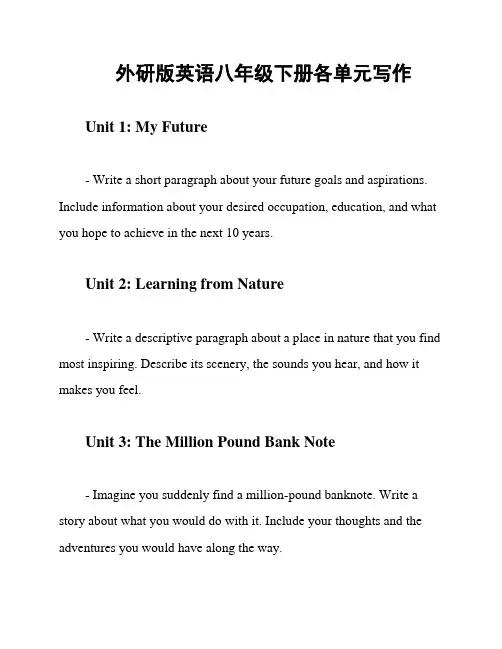
外研版英语八年级下册各单元写作Unit 1: My Future- Write a short paragraph about your future goals and aspirations. Include information about your desired occupation, education, and what you hope to achieve in the next 10 years.Unit 2: Learning from Nature- Write a descriptive paragraph about a place in nature that you find most inspiring. Describe its scenery, the sounds you hear, and how it makes you feel.Unit 3: The Million Pound Bank Note- Imagine you suddenly find a million-pound banknote. Write a story about what you would do with it. Include your thoughts and the adventures you would have along the way.Unit 4: Advertising- Write a persuasive essay about your favorite advertisement. Explain why it is effective and how it has influenced your purchasing decisions.Unit 5: Historical Places- Choose a historical place that you would like to visit. Write a travel brochure promoting this destination, highlighting its historical significance and attractions.Unit 6: Science Fiction FilmsUnit 7: Festivals around the World- Choose a festival from a different culture and write a report about it. Include information about its origins, traditions, and any unique customs associated with it.Unit 8: Protecting the Environment- Write a letter to a local government representative expressing your concerns about an environmental issue in your area. Provide suggestions on how they can address the problem.Unit 9: Unforgettable Moments- Write a personal narrative about a memorable experience in your life. Describe the event in detail and explain why it has had a lasting impact on you.Unit 10: From Dreams to Reality- Write a speech about the importance of pursuing one's dreams and turning them into reality. Provide examples and personal anecdotes to support your message.以上是《外研版英语八年级下册》各单元的写作练习题。
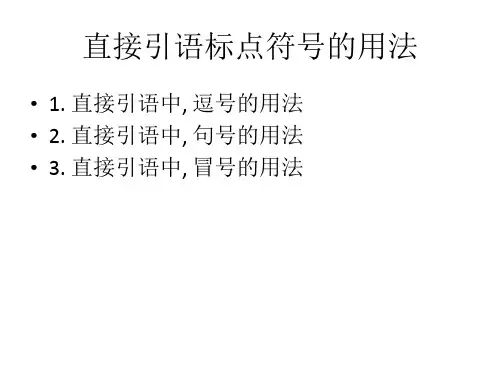
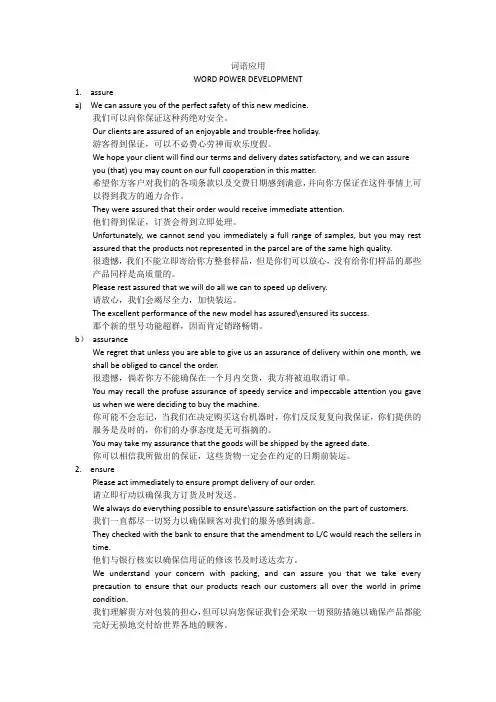
词语应用WORD POWER DEVELOPMENT1.assurea) We can assure you of the perfect safety of this new medicine.我们可以向你保证这种药绝对安全。
Our clients are assured of an enjoyable and trouble-free holiday.游客得到保证,可以不必费心劳神而欢乐度假。
We hope your client will find our terms and delivery dates satisfactory, and we can assure you (that) you may count on our full cooperation in this matter.希望你方客户对我们的各项条款以及交费日期感到满意,并向你方保证在这件事情上可以得到我方的通力合作。
They were assured that their order would receive immediate attention.他们得到保证,订货会得到立即处理。
Unfortunately, we cannot send you immediately a full range of samples, but you may rest assured that the products not represented in the parcel are of the same high quality.很遗憾,我们不能立即寄给你方整套样品,但是你们可以放心,没有给你们样品的那些产品同样是高质量的。
Please rest assured that we will do all we can to speed up delivery.请放心,我们会竭尽全力,加快装运。
The excellent performance of the new model has assured\ensured its success.那个新的型号功能超群,因而肯定销路畅销。

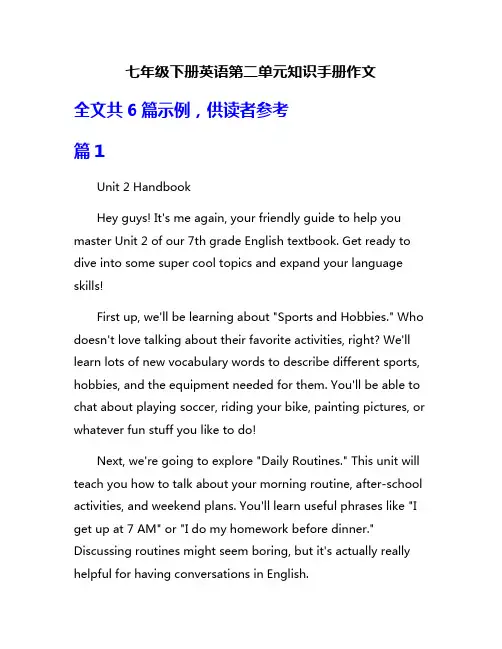
七年级下册英语第二单元知识手册作文全文共6篇示例,供读者参考篇1Unit 2 HandbookHey guys! It's me again, your friendly guide to help you master Unit 2 of our 7th grade English textbook. Get ready to dive into some super cool topics and expand your language skills!First up, we'll be learning about "Sports and Hobbies." Who doesn't love talking about their favorite activities, right? We'll learn lots of new vocabulary words to describe different sports, hobbies, and the equipment needed for them. You'll be able to chat about playing soccer, riding your bike, painting pictures, or whatever fun stuff you like to do!Next, we're going to explore "Daily Routines." This unit will teach you how to talk about your morning routine, after-school activities, and weekend plans. You'll learn useful phrases like "I get up at 7 AM" or "I do my homework before dinner." Discussing routines might seem boring, but it's actually really helpful for having conversations in English.The third part of this unit is "Vacations and Travel." Who doesn't dream about going on awesome vacations? We'll learn how to describe vacation destinations, talk about methods of transportation, and share stories about our travel adventures. You'll be able to say things like "Last summer, I went to the beach with my family" or "We took a train to visit my grandparents." Get ready for some wanderlust!Now let me give you some tips on how to really make this unit stick in your brain:Make flashcards! Write new vocabulary words on one side and the definition/picture on the other. Go through your flashcards while waiting in line or before bed.Keep a hobby journal. Each week, write a few sentences describing what hobbies/sports you did and how you felt about them. It's great writing practice!Listen to English podcasts, music, or movies featuring the unit topics. Hearing the language will help your comprehension.Play classroom games like charades or Pictionary to practice using new words in a fun way with friends.If you have amazing family vacation photos or videos, share them! Describe your travel experiences to classmates.Those are just some ideas, but use whatever works best for you to actively practice the language. The more you immerse yourself, the faster you'll improve!Okay, now let me break down the key grammar concepts we'll be focusing on:Present simple tense for habits/routines (I play tennis every Saturday.)Present continuous for actions happening now (She is watching a movie right now.)Be going to future tense for future plans (We are going to visit Spain next year.)There are also some really useful classroom expressions we'll learn, like:"How do you say ____ in English?""I don't understand the meaning of ____.""Can you repeat that please?"Having the right expressions will help you communicate better with your teacher and classmates.In the writing section, we'll practice skills like:Describing people's personalities, appearance, and activitiesSequencing words to explain processes and routinesUsing time expressions like "First, Next, Then, After that, Finally"For projects, be prepared for some fun stuff! You might keep an audio diary of your daily routine, create a brochure advertising your dream vacation, or film a video about your favorite hobby/sport. I'll give you more details when we get to those assignments.Phew, I know I covered a lot, but don't stress! Just take it step-by-step and use all the resources available like your textbook, worksheets, online practice, and your awesome teacher. This unit is going to be a blast, and you're going to learn so much practical English. Who's ready for the adventure?篇2Unit 2 Knowledge HandbookHi everyone! It's me again, your friend and guide through the world of 7th grade English. In this unit, we learned all about describing people's personalities and appearances. It was a funtopic because we got to talk about ourselves and our friends and families!Let me share what I picked up about describing people's personalities. First, we need to know some key vocabulary words for different personality traits. Some positive ones are:Friendly - This means someone who is nice, smiles a lot, and likes being around others. My best friend Jessica is very friendly.Outgoing - An outgoing person is social, confident, and talkative. They aren't shy! The class clown Billy is definitely outgoing.Patient - If someone is patient, it means they don't get frustrated or angry easily. They can wait calmly without getting upset. My mom is a really patient person.On the other hand, there are some negative personality traits too. Like:Rude - This is someone who is impolite and doesn't have good manners. Nobody likes a rude person!Lazy - A lazy person doesn't like working hard and puts off their responsibilities. My brother is pretty lazy about doing his chores.Moody - When someone is moody, their feelings change quickly and they can get upset over small things. My aunt gets moody sometimes.To describe personalities, you can use sentences like:"She is a very friendly girl who always has a smile on her face.""He tends to be quite lazy and put off doing his homework.""My grandfather is a patient man who never gets angry easily."Now let me explain how to describe someone's physical appearance and looks. There are lots of great adjectives for this! You can talk about:Height - Is the person tall, short, average height?Build - Are they thin, muscular, overweight, athletic?Hair - Describe the color, length, and style. Curly, straight, in a ponytail?Eyes - What color are their eyes? Big or small?Age - Are they young, old, middle-aged?Other features - Do they have freckles, dimples, wear glasses?Here are some example sentences:"John is a tall, skinny boy with blonde spiky hair and green eyes.""My aunt is a short, overweight woman with curly brown hair and big blue eyes.""The new student is a young girl with long, straight black hair and dimples."You can also compare people by saying things like:"Mike is taller than his little brother.""Sarah has longer hair than Jessica.""My dad is older and has more wrinkles than my mom."In addition to learning descriptions, we also practiced asking each other questions politely like:"Excuse me, what does your mom look like?""Can you describe your best friend's personality for me?""I'm curious, how old is your grandfather?"Overall, this was a really useful unit! Now we can all describe our family, friends, teachers, and even celebrities using great vocabulary. Knowing how to describe personalities and appearances will help us in so many situations.I hope this handbook helped summarize what we learned. Describing people's traits and looks is an important skill that lets us communicate clearly. We'll use this skill a ton in the future when writing stories, giving presentations, and just talking about the people in our lives. Practice making observations and you'll be a describing master!That's all for now. Cant wait for the next unit - it's going to be a fun one!篇3Unit 2 HandbookHey guys! It's me again, your friendly neighborhood 7th grader, here to give you the low-down on Unit 2 of our English textbook. Get ready, because this unit is all about exploring the great outdoors and going on awesome adventures!First up, we've got a ton of new vocabulary words to learn all about nature, camping, and outdoor activities. Some of the biggies are:Campsite - The spot where you pitch your tent when camping out in the wilderness. Hopefully you pick a flat, comfy one!Compass - That crucial little device that helps you figure out which direction you're headed so you don't get lost out there.Steep - When a hill or mountain trail gets really intense and goes way upwards at a sharp angle. Be careful on those steep climbs!Numerous - Meaning there's a huge quantity of something. Like the numerous mosquitoes that will probably bite you if you forget your repellent!I could go on, but you get the picture. There's a full vocabulary list in the unit, so make sure to review all those new words. They'll come in super handy when we start reading the longer texts.Speaking of texts, we've got some fascinating ones coming up that are all about daring real-life adventures and explorers. Get pumped to read about amazing people like:• Edmund Hillary - The first guy to conquer mighty Mount Everest. What a legend!• Amelia Earhart - One of the very first female aviation pioneers who broke records left and right flying across the globe.• Jacques Cousteau - An oceanographer who basically invented scuba diving as we know it so he could study the depths of the seas up close.Reading their stories and seeing how they overcame crazy challenges and obstacles is going to be so inspiring. I can't wait to learn more about their epic journeys and adventures.But that's not all! We're also going to be practicing tons of survival skills and outdoor safety tips. Like how to build a simple fire for warmth, what to pack in your backpack for a day hike, how to set up a tent, basic first aid stuff, and more. You know, just in case we ever get stranded in the woods and need to MacGyver our way out of there!On top of all that, I heard there's going to be a super fun group project where we get to plan out our dream camping trip or outdoor expedition. We'll get to research amazing destinations, map out routes, make supply lists, and basicallypretend we're about to become expert wilderness explorers ourselves. How cool is that?Oh, and I can't forget - we've got some awesome new songs and video lessons in this unit all about exploring and admiring the beauty of nature. Rumor has it there's even going to be a few guest speakers who are actual mountain climbers, forest rangers, or camping experts coming to share their knowledge with us. This unit is shaping up to be so epic!I really can't wait to dive in and start learning all about becoming an outdoor adventurer. Just imagine - in a few years, maybe I'll be the one conquering Everest or discovering new species in the rainforests! A guy can dream, right?Okay, that's my quick rundown on everything you need to know about Unit 2. Get psyched, because this is where our English class goes full Wilderness Explorer mode. Bring on the compasses, campfires, and crazy tales of adventure!Your pal,Adventurer-in-training篇4Title: My Awesome Knowledge Handbook!Hey guys! It's me again, your friend who loves to learn all about the world. I'm super excited to share with you my Knowledge Handbook all about the cool stuff we learned in Unit 2 of our English class. Get ready to have your mind blown!First up, we learned tons of fantastic vocabulary words. My favorite was "accomplish" which means to complete something successfully after working really hard on it. I accomplished eating my entire plateful of broccoli the other night! Huge win for me. Another awesome word was "burden" which is something heavy or difficult that you have to deal with. Like when my mom makes me clean my incredibly messy room - such a burden!Then there were the words "conform" and "convention." To conform means to behave the same way as others so you fit in. And a convention is a normal way of doing things that everyone accepts. For example, it's a convention to wear pajamas to bed rather than a formal tuxedo or ballgown. Unless you're just a totally weird kid who conforms to absolutely no conventions whatsoever!We also learned about phrases and expressions using the word "keep." Like if you keep a secret, it means you don't tell anyone about it. Or if you keep a promise, it means you do whatyou said you would do. Keeping secrets from my parents is hard work! It's way easier to keep skating than it is to keep secrets.Oh oh oh, and then we covered homonyms, homophones and homographs. Homonyms are words that sound the same but have different meanings and spellings, like "pair" and "pear." Homophones sound the same but have different meanings AND spellings, like "one" and "won." And homographs are words that are spelled the same but have different meanings, like "lead" the metal and "lead" meaning to guide someone. Isn't English just totally wacky and fun?!Moving on, we learned about using "used to" to describe past habits and situations that no longer happen. Like "I used to watch Sesame Street every morning when I was little, but now I watch cool shows for big kids." Using "used to" makes me sound so grown up and mature. Mommy must be so proud!And who could forget prefixes and suffixes? Prefixes go at the start of words to change their meaning, like "re" means "again" as in "rewrite." Suffixes go at the end, like "able" means "can be done" like "washable." Knowing tons of prefixes and suffixes makes you look mega smart when you use those fancy multisyllabic words correctly. I love impressing my teachers with my bigly vocabulistics!We covered sooooo much more cool grammar too, like the present perfect tense for things that started in the past and are still happening now. "I have studied English for years, and I'm still learning!" See what I did there? So skilled.There were reflexive pronouns like "myself" and "themselves" which are used when the subject and object are the same person. Like "I made myself a snack" or "The kids played by themselves." Applying reflexives is an exercise inself-improvement for sure!Modals like "can," "should," "must" and others were really fun to learn. You use them with other verbs to express ability, obligation, permission and other modal concepts. "I can run fast" or "You should clean your room" or "We must leave for school soon." Modals make everything sound more reinforcable and can't-be-ignorable!Phew, I haven't even gotten to the Unit 2 reading passages yet! We read all about historic explorers like Jacques Cousteau and his awesome deep-sea adventures. And amazing mountain climbers who brave sub-zero temperatures to scale the tallest peaks. Climbing Mt. Everest has to be one of the most arduous explorations ever!We learned about colonists who left their home countries and voyaged across vast oceans to explore and settle new lands. Can you imagine being a kid on one of those tiny ships tossed around by storms for months? No video games or even books - I'd die of boredom!Then there were wildlife explorers like Jane Goodall who camped in the jungle for years to study chimpanzees and their super cool behaviors up close. Bug bites, wild animals, lack of showers...not for me, no thank you! I'll just watch chimp videos from the comfort of my couch.By now you can tell I absorbed so much amazing knowledge from Unit 2! I'm like a walking, talking encyclopedia of exploring, adventuring, word wizardry and grammar mastery. Just call me "Professor" from now on!I really hope you enjoyed leafing through the pages of my Knowledge Handbook. Maybe you even discovered some new facts or vocabulary gems inside! Learning is the greatest exploration of all in my humble third grade opinion. Every single day, simply by opening my books and my mind, I get to travel to new realms of understanding about this incredible universe we live in. That's an epic adventure if you ask me!Okay, I'll stop rambling now. But wasn't Unit 2 just stupendously stupendous? I can't wait to stock my brain with more world-expanding wisdom in Unit 3. Love you, mean it! See you next time, my friends!篇5Unit 2 Study GuideHi everyone! It's me again, ready to share my super cool study guide for Unit 2 of our English book. This unit was all about talking about daily routines, housework, and weekend activities. Pretty fun stuff if you ask me!Let me start by going over some of the key vocabulary we learned. The first words that come to mind are words for household chores like:• Wash the dishes• Make the bed• Take out the trash• Do the laundry• Vacuum the floor• Dust the furnitureWow, just thinking about all those chores is making me tired! We had to learn how to say what we do in the morning, afternoon, and evening too. Like "In the morning I get dressed, brush my teeth, and eat breakfast." Boring!But the vocabulary for weekend activities was way more fun. We learned words like:• Go shopping• Watch a movie• Play video games• Have a sleepover• Go to the park• Play sportsThose are some of my favorite weekend activities for sure. Especially video games - I'm an expert gamer if I do say so myself!Ok, now let's talk about some of the grammar we covered. The biggest things were using frequency adverbs like:• Always• Usually• Often• Sometimes• Rarely• NeverWe had to make sentences using those adverbs to describe our routines. For example, "I always brush my teeth in the morning" or "I sometimes stay up late playing video games on the weekend." Using frequency adverbs is a good way to make your speaking and writing sound more natural.Another major grammar point was using the simple present tense to talk about habits and routines. We had to conjugate a ton of verbs and make sentences like:• I get up at 7 AM.• He watches TV after school.• We go to the mall on Saturdays.• You never do your homework!Using the simple present tense the right way was kind of tricky at first, but I think I've got the hang of it now. Verb conjugations can be so annoying sometimes though!The last big grammar topic was making negative statements with "don't" and "doesn't." Like:• I don't play sports on weekends.• He doesn't make his bed in the morning.• They don't go shopping very often.Using "don't" and "doesn't" properly was difficult because you have to remember to use "don't" with I, you, we, and they, but "doesn't" with he, she, and it. It's all about subject-verb agreement!There were a couple other little things we went over too, like using prepositions of time (in the morning, on Monday, at 8 PM) and making questions by inverting the subject and verb (Do you walk the dog? When does he get home from school?). But those were pretty easy compared to the bigger grammar topics.Overall, I'd say Unit 2 was pretty fun and interesting. Learning about daily routines and weekend plans wasn't the most exciting topic ever, but at least it's stuff we can actually use in real life conversations. That's what I think learning English should be all about!Describing my own routines and schedules was easy enough. But when we had to start asking each other questions, things gota little trickier. Like, you really have to LISTEN to what other people say instead of just waiting for your turn to talk. I'm still working on my listening skills for sure.The group conversations and role plays we did in class were great practice though. It was pretty funny when me and my friends had to pretend to be parents arguing about who does more housework. I don't think any of us actually do any chores at home, but it was still hilarious!Another activity I really enjoyed was interviewing classmates about their favorite weekend activities. Hearing about how Amanda loves going shopping at the mall, or how Brian is obsessed with playing basketball, made the grammar practice way more fun and engaging. Maybe they'll interview me next time about my world-class gaming abilities!Of course, we can't forget about the Unit 2 writing assignment - describing a typical weekend day for you. I actually thought that was one of the easier prompts we've had to do. I basically just made a schedule like:8 AM - Wake up9 AM - Eat breakfast10 AM - Start playing video games12 PM - Take a break for lunch1 PM - Keep gaming6 PM - Have dinner with family8 PM - More video games!11 PM - Get ready for bedSee, describing a routine isn't too hard when it's something you know really well, like an ideal weekend for a major gamer like myself. I tried to sprinkle in some frequency adverbs too, like "I usually wake up around 8 AM" and "I sometimes take a break to have lunch." Basically just following the formula we practiced in class.The other big test for this unit was the speaking evaluation, where we had to answer questions about our daily schedules. I was a little nervous for that one, not gonna lie. Speaking out loud is one of the hardest parts of learning English!But I did some practice conversations with my parents to get ready, and I made sure to use lots of simple present verbs ("I get home from school at 3:30 PM") and frequency adverbs ("I rarely have time for video games on weeknights"). I probably said "um" and "like" too much, but overall I think I did pretty well!Phew, that was a super long study guide, but I really wanted to make sure I covered absolutely everything from Unit 2. I bet you're an expert on daily routines and housework activities now!Just to wrap up, I'll give you a few pieces of advice for your continued English studies:Keep practicing having conversations, even if it feels awkward at first. That's the best way to get better at speaking!Don't just memorize vocabulary lists - learn words by talking about your actual daily life and weekend activities. It'll help you remember better.Review the simple present tense verb conjugations as much as you need to. That's one of the most important grammar points to master.Do lots of listening practice, not just reading and writing. Listening comprehension is a huge part of learning any language.And most importantly - try to have fun with it! Learning English doesn't have to be all boring grammar drills and textbook exercises. Make it relevant to your actual life and interests.Okay, I could probably go on forever, but I'll stop there. Thanks for reading my crazy long study guide! I hope it helps you feel totally prepared for any Unit 2 tests, quizzes, or assignments you have coming up. Just doing my part to help out my fellow English learners!Let me know if you have any other questions at all. And do me a favor - tell our teacher Ms. Williams that I actually did my homework for once! Maybe she'll be so shocked that she'll give me a few bonus points or something. A guy can dream, right?Alright, see you all next time for an even MORE epic study guide! This one's gonna be hard to top though. Unit 2, you've officially been... STUDIED!篇6Hi friends! In this essay, I'm going to tell you all about the second unit we learned in our 7th grade English class. Get ready, because there's a lot to cover!The unit was called "Making a Difference" and it was all about how we can make positive changes in our communities and the world around us. Pretty cool, right? We learned lots of new vocabulary words related to this topic. Some of the wordswere "volunteer", "donate", "fundraiser", and "campaign". Do you know what those words mean?Volunteer means when you offer to do some kind of work for free because you want to help. Like if you volunteer at an animal shelter, you go there and play with the puppies and kittens and help take care of them without getting paid. Donate means to give something away for free, like donating clothes or toys you don't need anymore to a charity. A fundraiser is an event where people collect money for a good cause. And a campaign is an organized effort to achieve something, like a campaign to clean up a local park.We read some really inspirational stories about kids our age who started campaigns and fundraisers to help their communities. There was this one girl named Mallory who started a campaign called "Kids Against Hunger" where she raised money and collected food donations for people in need. Then there was a boy named Ryan who started a huge recycling program at his school to teach people about taking care of the environment. Seeing what kids like us could do really made me want to get out there and make a difference too!In the unit, we also learned about how to use certain grammar like the present perfect tense. That's for talking aboutthings that started in the past and are still happening now. Like you could say "I have volunteered at the animal shelter for two years." We practiced using a lot of "has/have been" structures.There were also lessons on how to write persuasive letters and give persuasive speeches. The key is to state your opinion clearly, give strong reasons and evidence to support it, and have a powerful conclusion that calls people to action. We had to write a letter to our school principal persuading them to start a new recycling program. I gave reasons like "It will reduce waste" and "It teacheskids good environmental habits." Using strong, convincing language is important.One of my favorite activities was when we had to come up with our own fundraising idea and make a poster advertising it. I decided to do a fundraiser called "Pups 'n' Pals" where kids could pay 5 to come read books to rescued animals at the animal shelter. With the money raised, we could buy supplies for the shelter. I made a big poster with bright colors and a drawing of a puppy holding a book. It looked so cute!We also watched some video clips that showed kids doing volunteer work at places like food banks, retirement homes, beach cleanups, and tree planting events. It looked hard butrewarding. The kids in the videos all talked about how good it made them feel to help others and make their community better.At the end of the unit, we had to write an essay about an issue we care about and how we could make a positive difference.I wrote about how we need moreprotections for endangered animal species, and my idea was to organize a petition that all my classmates could sign. Then we could send it to our government leaders urging them to pass new laws.I really enjoyed this whole unit because it opened my eyes to how even kids like us are capable of being leaders andchange-makers in our communities. As long as we care about something and are willing to work hard, we can absolutely make the world a little bit better. After learning all this, I feel inspired to look for ways to get involved and use my voice for good causes. Who's with me? Let's go out and make a difference!。
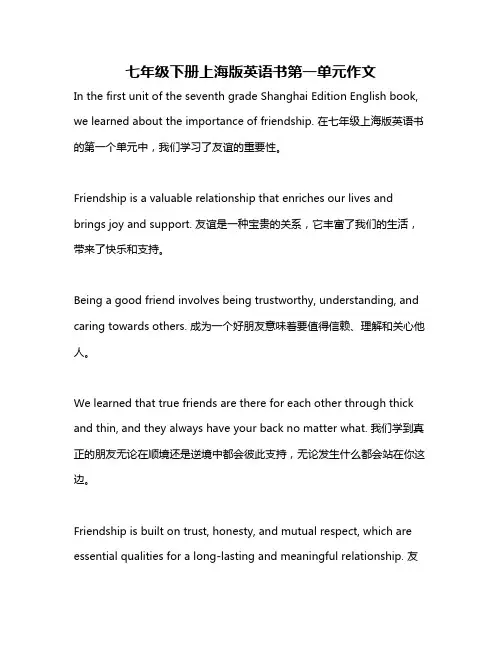
七年级下册上海版英语书第一单元作文In the first unit of the seventh grade Shanghai Edition English book, we learned about the importance of friendship. 在七年级上海版英语书的第一个单元中,我们学习了友谊的重要性。
Friendship is a valuable relationship that enriches our lives and brings joy and support. 友谊是一种宝贵的关系,它丰富了我们的生活,带来了快乐和支持。
Being a good friend involves being trustworthy, understanding, and caring towards others. 成为一个好朋友意味着要值得信赖、理解和关心他人。
We learned that true friends are there for each other through thick and thin, and they always have your back no matter what. 我们学到真正的朋友无论在顺境还是逆境中都会彼此支持,无论发生什么都会站在你这边。
Friendship is built on trust, honesty, and mutual respect, which are essential qualities for a long-lasting and meaningful relationship. 友谊建立在信任、诚实和相互尊重的基础上,这些是维持长久且有意义的关系所必需的品质。
The unit also highlighted the importance of communication in maintaining strong friendships and resolving conflicts. 这个单元也强调了在保持强大友谊和解决冲突方面交流的重要性。

1.Appreciatea)We thank you for your inquiry of 12 October, and appreciate your interest in ourproducts.你方10月12日询购函收到,谢谢。
你方有意购买我公司产品,我们对此表示感谢。
We would appreciate a prompt answer and a sample of each of the items listed above.如能立即给予答复,并对上述所列每项产品提供一件样品,我们将非常感激。
Your special care in handing this order would therefore be appreciated.贵方若特别细致地办理此订单,我方不胜感激。
We would appreciate it (very much)if you could agree to our suggested terms of payment.贵方如能同意我方提出的付款条件,我们将不胜感激。
b)We do appreciate (=understand)your reasons for objecting to the proposal,buthope to revert to this matter when circumstances permit.尽管我们非常理解你们不同意这个建议所持的理由,但是我们希望一旦条件允许,我们可以重谈此事。
appreciativeI realize the value of time to a busy person like you,and this makes me all themore appreciative of the time you have to generously given me.我深知时间对于您这样一位忙人是何等的宝贵,因此您花那么多时间和我交流,使我感激不尽。
词语应用WORD POWER DEVELOPMENT1.advantagea)Another advantage of our new model is reliability.新型号的另一个优点是其性能可靠。
There are many advantages in making computers as small as possible.把计算机造得尽可能地小会带来许多优点。
b)If you wish to take advantage of this offer, please use the enclosed order form.如果您接受这个报盘,请填写随函所附的订单。
We hope you will take full advantage of the exceptional opportunities nowopen in export.我们希望你们能充分利用当前在出口方面的特殊机会。
We are interested in handling a sole agency for you, which we think would beto our mutual advantage.我们很乐意为贵方办理独家代理业务,而且认为这将对我们双方都有利。
You will find it to the advantage of both the buyer and the seller to accept ourproposal.你会发现接受我方的建议买卖双方都有利。
AdvantageousThe new process would be particularly advantageous to small factories.2.demand v.The coming business negotiation will demand great patience.对即将展开的商务谈判需要有足够的耐心。
下册英语第三单元小册子作文English:In the third unit of the English textbook, we delve into the theme of environmental protection, a topic of immense global significance. This unit aims to raise students' awareness of environmental issues and inspire them to take action to preserve and protect our planet. Through engaging readings, thought-provoking discussions, and interactive activities, students learn about the various environmental challenges facing our world today, such as pollution, deforestation, and climate change. They also explore the importance of biodiversity and the interconnectedness of ecosystems. Moreover, the unit emphasizes the role of individuals, communities, and governments in mitigating environmental degradation and promoting sustainability. Students are encouraged to reflect on their own habits and behaviors and consider how they can make a positive impact on the environment in their daily lives. By the end of the unit, students should not only possess a deeper understanding of environmental issues but also feel empowered to become agents of change in their communities and beyond.Translated content:在英语教科书的第三单元中,我们深入探讨了环境保护这一全球性的重要主题。
英语写作第一册使用阶段:一年级第二学期教学目的:学生在学完该册后,能正确理解和掌握英语句子成分与结构以及词汇用法,并能够按照不同要求正确写出英语句子,能改写或缩写课文内容,并能正确写出150个单词左右的短文;能正确书写便条和通知等应用文;能正确运用标点符号。
教学安排:本册共10个单元。
每周2节课,每两周上一个单元。
教学模式:第一册融合了国内外先进的写作教学模式,强调写作过程的教学,积极鼓励学生参与课堂教学,培养学生获取知识的能力、运用知识的能力、分析问题的能力、独立提出见解的能力和创新的能力。
基本框架:Part 1 Warm-up activitiesPart 2 FocusPart 3 GrammarPart 4 WritingPart 5 Follow-up exercisesUnit 1 THE CORRECT WORDUnit ObjectivesAt the end of the unit you will be able to1.recognize multiple meanings a word may have, i.e. denotative andconnotative meanings, affective and collocative meanings;2.identify false friends in English and learn to choose the correct wordfor an idea3.learn to avoid making errors in subject-verb agreement; and4.write a simple note.Part 1 Warm-up activitiesForm pairs and each write a short paragraph about AIDS and AIDS patients.Student A: Do you think AIDS is a horrible disease? How horrible is it? Are you afraid of AIDS patients? What do you think of them? Write a short paragraph to express your views.Student B: Suppose you are an AIDS patient, do you think there exists any difference between AIDS and other fatal diseases like cancer? Do you think you are a threat to public health? Write a short paragraph to express your views.Part II FocusDenotation and ConnotationSuppose you are going to write about a respectable teacher whose bodysize is above the average. Choose the one you would use from the sentences below, and then discuss the inappropriateness of the other two:a.He/She is plump.b.He/She is portly.c.He/She is fat.*So the works “fat, portly and plump”do not just mean overweight; they also suggest whether it is pleasant or unpleasant. We call the suggested meaning of a word its connotation.Denotation, on the other hand, refers to the literal and primary meaning of a word—the definition you find in a dictionary.For example:Mother denotes a woman who is a parent but connotes qualities such as protectiveness and affection; and weed denotes an uncultivated plant but connotes destruction and uncontrolled growth. When we write, we have to watch out for the connotative meaning of a word; otherwise, we may make silly mistakes.Exercise: filling in the table below*A good example is the word “gold". The denotation of gold is a malleable, ductile, yellow element. The connotations, however, are the ideas associated with gold, such as greed, luxury, or avarice and also something very good. If you say that someone has a heart of gold, you are emphasizing that they are very good and kind to other people.Thus 'home' denotes the house where one lives, but connotes privacy and intimacy.The word 'eagle' connotes ideas of liberty and freedom that have little to do with the word's literal meaning.Heart: an organ that circulates blood throughout the body. Here the word "heart" denotes the actual organ, while on another context, the word "heart" may connote feelings of love or heartache.(My heart is broken)Sweater: a knitted garment for the upper body. The word "sweater" may denote pullover sweater, while "sweater" may also connote feelings of warmness or security.Summary:Denotation allows the reader to know the exact meaning of a word so that he or she will better understand the work of literature. It is the literal meaning of a word. (Literal meaning)Connotations relate not to a word's actual meaning, or denotation, but rather to the ideas or qualities that are implied by that word. (implied meaning)AttitudeIn all kinds of writing, the words you choose may do more than inform. The selection of a word often reveals how you feel about your subject, whether you are pleasant, angry, critical or admiring. See if you can detect in th e following sentences how the writer’s attitude changes from sentence to sentence:a.What a slim girl she is!b.How thin the girl is!c.The girl is so skinny!*The slim suggests the writer’s approval of the girl’s figure, while the word skinny is just the opposite. No girl will feel flattered if she is said to be skinny, as it is next to a bag of bones! So the three words, though similar in their denotative meaning, are diverse in affective meanings—that is, they reveal different attitudes of the writer.When we write in English, we have to be careful with such emotionally loaded words-i.e. words that can reveal the writer’s attitude.The affective meaning of the word is connected to a person's personal emotions and how that would influence word choice.Practice:One of our friends is attractively thin and graceful. Is she slender or skinny?You are describing some nurses working in a hospital who are pleasant and talk a lot in a friendly way making patents less nervous. Are they pleasant and chatty, or pleasant and talkative?The meanings of the above words and expressions are emotion-loaded. They express implicitly the speaker or writer’s feelings and attitudes. Affective meaning refers to the part of meaning which conveys thespeaker’s/writer’s emotions abo ut and attitudes towards the person or thing he/she is speaking/writing about.Words that have affective values generally fall into three categories:1. Appreciative (favorable)Words of appreciative implication are positive, expressing the writer’s app reciation or attitude of approval.2. Neutral/general3. Derogatory (unfavorable)Words of derogatory connotations are negative, suggesting disapproving attitudes, contempt or criticism.Example:Childlike vs.childish (appreciative vs. derogative)resolute, firm vs.stubborn, obstinate, pigheaded (appreciative vs. derogative)shrewd vs.crafty (appreciative vs. derogative)tough-minded vs. ruthless (appreciative vs. derogative)Practice:Look at the following ten groups of words and expressions. In each group, words and expressions have similar denotation but vary in affective value. According to their affective values, put them into thecategories they belong to in the table.1)spinster, unmarried woman,2)cocky, proud, arrogant, self-confident3)prudent, timid, shy, cowardly4)sly, wise, foxy, clever,5)tempting, attracting, charming,6)dismissed, fired7)salesman, product representative8)old age, golden years, fossil9)strong-willed, stubborn, persistent10)updated, newWork in pairs and compare your writings in the Warm-up activities. Pay special attention to words showing attitudes and those rich in connotative meanings. Correct any misuse. CollocationFill in the blanks with do or make.a. ___________ somebody a favorb. ___________ somebody goodc. ___________ a gestured. ___________ evilf. ___________ an effortCertain words tend to occur together regularly. For example, when we describe coffee, we can say strong coffee or weak coffee, but when we describe soup, we cannot say the soup is strong or weak; instead we say the soup is thick or thin. From this we can see certain nouns are usually modified by certain adjectives andwords of the same meaning are not interchangeable in this situation. We call this fixed combination of words collocation. There are several types of collocation:Verb plus noun: follow the fashionAdjective plus noun: a brilliant successVerb plus adverb: think alikePreposition plus noun: (the answer) to a questionVerb plus preposition: think of (an idea)Conclusion:Learning a word is usually is not only learning its meaning; it also includes learning which word or words it usually goes with, that is, its collocations.Classroom ActivitiesChoose the best modifiers for the following noun phrases.1. He spoke English with a _____ French accent.A.thickB.powerfulC.widespreadD.pronounced2. He gave us a _____ account of all that you had achieved over there.A.ReadyB.BrightC.ColorfulD.Glowing3. We need to find a new site with _________ access to the European motorway network.A.readyB.outrightC.StraightD.widespread4. We need to take some ________ action before it is too late.A.AcuteB.DecisiveC.StrongD.IntenseFalse friendsFalse friends are pairs of words or phrases in two languages or dialects that look or sound similar, but differ in meaning.Read the following conversation between Alice and the Red and White Queens in Lewis Carroll’s Through the Looking Glass and What Alice Found There.“Can you answer useful questions?”asked the Red Queen. “How is bread made?”“I know that!” Alice cried eagerly. “You take some flour …”“Where do you pick the flower?” the White Queen asked. “In a garden or in the hedges?”“Well, it isn’t picked at all,” Alice explained, “it’s ground …”“How many acres of ground?” said the White Queen. “You mustn’t leave out so many things.”Can you find out the cause of the misunderstanding? Explanation:Words like flour and flower, ground(pp) and ground(n) in this dialogue are troublesome and their misuse can easily causemisunderstanding. We call pairs of words similar in appearance or pronunciation but different in meaning false friends.Examples:Advise vs. adviceAffect vs. effectComplement vs. complimentContinually vs. continuouslyAngel vs. angleCapital vs. capitolConscious vs. consciencePractice:Fill in the blanks below with the right word in brackets, change the form where necessary.1.Your fever ________ (rise, raise) yesterday.2.It is easier to talk about a __________ (principle, principal)than to live by it.3.Our _____ (principle, principal) played on the facultyfootball team against the school all-stars.4.Is that table _________ (stationary, stationery), or can it bemoved to another corner of the room?5.White __________ (stationary, stationery) is alwaysappropriate.Can you think of any other false friends? Work in pairsand make a list of at least five pairs. Compare theirmeanings and write a sentence with each word to illustrateits meaning.Part IV WritingNotes (1)Read the following sample and answer the questions.Sample 1Helen,I am writing to thank you for the wonderful time I had at your dinner party last night.DavidQuestions:1. Why do people write notes?2. What are the components of a note?3. What are the characteristics of a note?Read the following sample and answer the questions.Sample 2Dear Mr. Li,I am writing to tell you how grateful I am for all you did for me in Shanghai. I hope that you will contact me if there is anything I can do for you. In particular, I should be most glad to send you or the Department any books you need.Yours faithfullyR.V.JohnsonIntroduction to notes/letters of thanks1. A note/letter of thanks usually includes:1)thanking (thank you for…)2)describing the reason (…for making my stay inEdinburgh so pleasant …)3)expressing pleasure (I enjoyed myself enormously …)便条(Notes)1. 便条的写作相对来说比较简单,重要的是格式,尤其要注意邀请类,预约类和道歉类便条的写法。
词语应用WORD POWER DEVELPOMENT1. discount n.Will you please also indicate delivery times, your terms of payment, and details of discount for regular purchases and large orders?能否能交换时间,你的付款方式,以及对于经常订购和大批量订货所给的折扣的详细情况也告诉我们?However, we would be willing to allow\grant\offer you a special 2.5% discount if you could see your way to increasing your order to $50,000.尽管如此,如果能将订购增加到5万美元的话,我们将愿意给您一个2.5%的特殊折扣。
We stress, however, that this offer, because of the special discount and limited stocks remaining, is open for only 14 days from the date of this letter.然而,我们想强调一下,由于这是个特殊折扣、并且库存有限,因此本报盘的有效期仅为写信之日起14天。
The prices quoted are subjected to the usual trade discount.所报价格均享有通常的同业折扣。
The following items are offered at a discount of 10%.下列产品以九折报盘。
V.That original price was discounted by 10%.那个原价被打了10%的折扣。
They discount 10% from the original price.他们将原价打了10%的折扣。
写作教程第一册unit9follow-upactivitiesFollow-up activity:1.P aragraph A:After years of trial and error, Disney finally found the character he has looking for. This character, called “Mickey Mouse,” was first introduced in the cartoon Plane Crazy and later found ultimate fame in Steamboat Willie, the first sound cartoon ever made and a great achievement for Disney. By 1930, after his fame had spread all over the world, Mickey was established as the cinema’s most popular cartoon character. Because Mickey was a moralist with a sense of fun, he became a character loved by all ages. In him, Walt Disney reached his peak of success.Paragraph B:Environmental protection will benefit us a lot. First, by making our air purer and water cleaner, we can improve our living condition. As we all know, a healthful living condition is essential to our work and study. Second, environmental protection does good for the younger generation. It not only improves our children’s health, but also teaches our children a good attitude toward the environment.Third, environmental protection saves our resources. Since we can recycle used materials instead of throwing them away, we can get more material but produce less waste.2.T his is only one child in many families in China, so many parents andgrandparents love the child to such an extent that they do not allow them to do anything when they think there may be a slight chance of their child getting hurt. Many parents escorttheir child to school every morning. Therefore, when the child grows up, he still can’t do anything.Look at the picture. The girl wants to learn to ride a bike, but her parents and grandparents wouldn’t let go. I think these parents should have let the girl ride the bike by herself.It is bad for parents to love their children too much. If they help their children in everything, their children will always be unable to do their own work. When they grow up, these children will find that things are totally different in their working place.Therefore, parents should let their children do things on their own.3.a. A boy wants something very special from his father.b. A favor may not be a favor at all.c. I do play roles.。